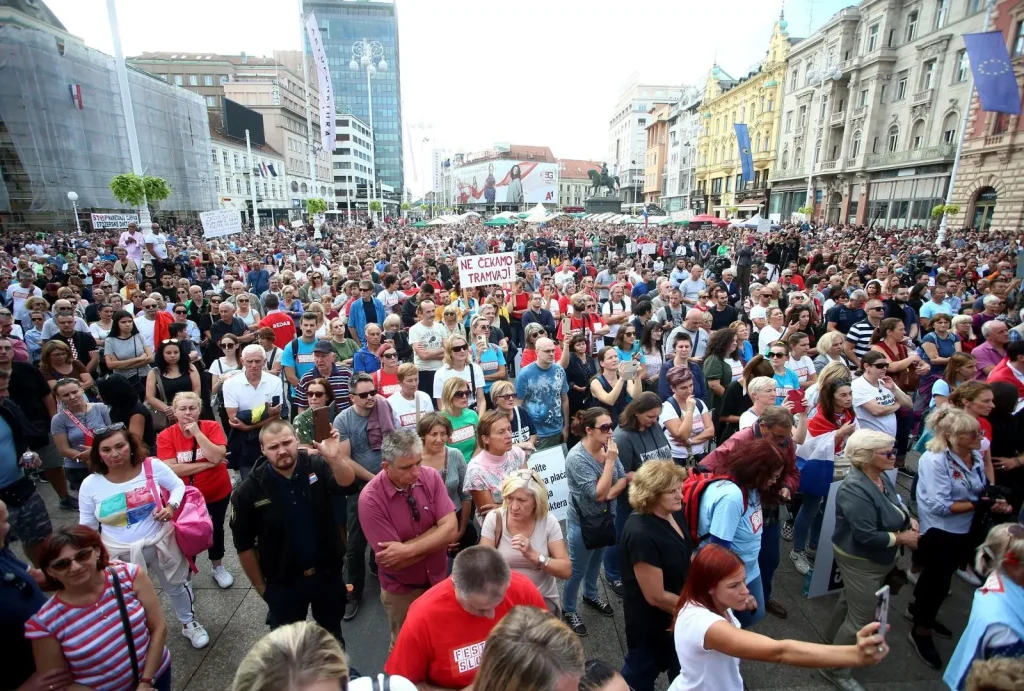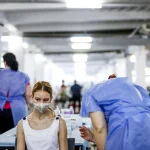We are witnessing the biggest pandemic in modern history which has caused unprecedented disruptions in everyday life and enormous damage to the global economy, SOA director Daniel Markić says in the introduction.
The pandemic has additionally increased extremism and radicalism, notably due to disinformation and conspiracy theories concerning Europe’s response to the crisis and the effectiveness of democratic and liberal political and social systems, SOA’s seventh report says.
Despite 20 years of international efforts in bringing democracy to the local society, the Taliban have taken power in Afghanistan.
SOA also monitored the increasing world dominance of geopolitical reshufflings and competitions as well as the strengthening of the economic, political, and value challengers to liberal democracies in the international order.
Climate change is increasingly showing its consequences, the report says.
Non-Western actors active in the southeastern neighborhood
It indicates that non-Western actors are active in Croatia’s southeastern neighborhood and that reforms aimed at reaching European standards are slow.
The Western Balkans is still burdened by unfinished stabilization processes and unsolved inter-state and inter-ethnic issues as well as difficulties in achieving European integration due to insufficient reforms.
Unfavorable political and economic conditions facilitate the strengthening of radical and extreme tendencies as well as rifts within fragile societies, and social and inter-ethnic tensions may lead to incidents, notably in communities with unsolved inter-ethnic relations.
Bosnia and Herzegovina are still politically unstable, primarily due to the different views its constituent peoples have on the country’s future constitutional and legal system.
Failure to reach a Serbian-Albanian agreement on Kosovo continues to contribute to instability in the region, and the social rift in Montenegro, where parties of anti-NATO, pro-Serb, and pro-Russian orientation have significant political power in relation to sovereignist, pro-Western forces, is causing particular uncertainty in the Western Balkans.
Promotion of the “Serbian world” additionally destabilizes delicate relations
In the regional context, some state officials in Serbia are promoting the concept of a “Serbian world” as a single Serbian political people and a single political and state union of all Serbs in Southeast Europe in which all Serbs should follow one political direction, that of Serbia.
The promotion of such ideas by Serbia’s top officials is additionally destabilizing the delicate inter-ethnic and inter-state relations in Southeast Europe, notably in regards to BiH and Montenegro.
Organized crime in this part of Europe is additionally bolstered by the proliferation of illegal activities, while hotspots like Syria and Libya continue to represent sources of instability and threats.
Cyber technologies have facilitated large-scale cyberattacks aimed at stealing state and industry data, while illegal migration has increased enormously in Southeast Europe, with hundreds of thousands of migrants passing through.
Croatia target of dozens of state-sponsored cyberattacks in recent years
SOA warns that state-sponsored cyberattacks are becoming increasingly common in espionage.
Those attacks are aimed at carefully selected targets that have been well studied in advance, and they are carried out by state-sponsored APT (Advanced Persistent Threat) groups that are closely linked to the security and intelligence systems of individual countries. Such cyber-attacks are primarily aimed at EU and NATO member states.
In recent years, Croatia has been the target of dozens of state-sponsored cyber attacks. The largest number of them were attempting to break into the information and communication systems of the Ministry of Foreign and European Affairs and the Ministry of Defence.
SOA concludes that cyber resilience is becoming a key to national security in the digital era.
The past period was also marked by the creation, rapid expansion, and territorial defeat of the Islamic State, the largest terrorist organization in the world, and the agency has also been monitoring how the spread of democratic values in the world has been replaced by authoritarian tendencies with the return of Cold War tensions, espionage, and the spreading of fake news and propaganda.
There are currently no identified direct terrorist threats to Croatian institutions, citizens, or interest from terrorist groups, and the threat of organized attacks by terrorist groups is still low, but the possibility of a terrorist attack (primarily by independent attackers) can never be ruled out.
Although ISIL and Al Qaida have been significantly weakened and their capacities for carrying out external operations and attacks have been reduced, they remain a threat to Europe. In EU member states, the level of threat from Islamist terrorism varies from low in Central and Eastern European countries to medium or high in most Western European countries.
Many steps forward in the security sphere
Since its first public report, SOA has also followed a number of developments in the security sphere.
EU and NATO membership has allowed us to multiply our capabilities and strengthen our security mechanisms and links to other democratic security and intelligence systems; European countries are getting closer to confronting common security threats; Croatian society and institutions have confirmed their stability and efficiency in many crises situations, the report says.
In addition to that, new infrastructure projects have strengthened energy and national security, SOA says, noting that they are building a new generation of employees through public calls.
All those changes show that security dynamics in the modern world are extremely fast and often unpredictable, new and non-traditional security threats are emerging, and the role of timely and accurate information and assessments is becoming crucial, SOA says.
The report published on the SOA website also stresses that there is no indication of significant destabilization for Croatia, even at such a challenging time and in such a dynamic security environment.
For more on politics, follow TCN’s dedicated page.












